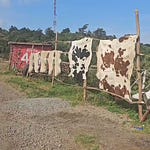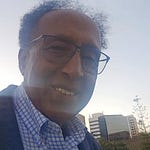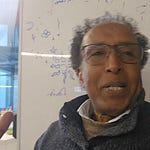Week 50 of 2024 commenced with an intense schedule, beginning with a 14-hour flight from Dubai directly followed by participation in the TESSI conference at Swinburne University It marked an intellectually stimulating conclusion to the year and I will cover more on this soon on week 1 of 2025. The Somali Studies International Association (SSIA) conference is taking place in Mogadishu under the ambitious theme, "Reconstructing and Developing Somalia: Pathways to Sustainable Progress". As referenced in my "Five Minutes of Fame" video, I plan to engage with this theme by offering insights into its implications for Somalia's political and socio-economic landscape.
I will revisit and expand upon the critical discussion initiated last week on Somalia and Federalism. Federalism remains a contentious yet pivotal issue in Somali politics, deeply intertwined with questions of national unity, equitable resource distribution, and the devolution of power. By revisiting this topic, I aim to provide a more nuanced perspective on how federalism, when implemented effectively, could serve as a framework for fostering inclusivity and stability within Somalia's fragmented political landscape. Through these reflections, I seek to contribute to the broader discourse on Somalia's reconstruction and development, engaging with both the theoretical and practical dimensions of sustainable progress.
Somali Studies International Association (SSIA) Congress
The Somali Studies International Congress is a platform for scholarly dialogue on Somali culture, history, and contemporary issues. A Brief History of the Somali Studies International Association reminds us that ‘The first steps toward the formation of a Somali Studies association were taken at an informal meeting of interested scholars who had convened in Chicago in April 1978 for the Fifth International Conference on Ethiopian Studies. It may seem surprising that the seeds for a Somali Studies association were sown at a conference of Ethiopianists, but we have to remember that prior to the mid-1970s, the number of Somali specialists was very small and Somali Studies was considered by most academics as a peripheral subfield of Ethiopian Studies…’
The 15th SSIA Congress is being held in Mogadishu symbolizes a renewed commitment to revitalizing academic and intellectual engagement within the country.
Hosted by the Somali National University, the congress represents a significant milestone in Somali studies, emphasizing resilience and progress within the Somali academic community. The SSIA has organized numerous congresses since its inception in 1978, each focusing on various themes pertinent to Somali studies. While I could not find a detailed themes for some early congresses. Please send me info on the missing themes and other information… Ancora imparo, as they say at my alma mater, Monash University.
Many Somalis in the diaspora eagerly anticipated the conference, viewing it as an opportunity to engage with and contribute to discussions on Somali studies. Unfortunately, the experiences of some participants fell short of expectations. A number of individuals who submitted abstracts reported that their submissions went unacknowledged, a practice that reflects poorly on the organizational standards of the event. Silence as a form of rejection should not be normalized, particularly by educational institutions, which are expected to uphold a baseline of professional decorum in their communications. Furthermore, the unannounced delays and lack of updates contributed to a negative perception of the event's management. While these shortcomings are regrettable, the primary objective should be to identify lessons learned and implement measures to prevent similar issues in the future.
One of the more glaring oversights was the absence of online accessibility to the event. In an era when the dissemination of information increasingly relies on digital platforms, it was reasonable to expect that links to the event, whether live-streamed or archived, would be available through authoritative channels such as the Somali National University’s website, or the Ministry of Education. Equally concerning was the limited media coverage of the conference by national outlets such as Radio Mogadishu and Somali National TV . Comprehensive reporting by these platforms would have not only amplified the event’s reach but also underscored its national importance.
The absence of robust media engagement suggests a need for better coordination between event organizers and national broadcasters. The lack of such access represents a missed opportunity to engage a broader audience, including the Somali diaspora and scholars worldwide. This omission underscores the need for future conferences to prioritize digital accessibility, ensuring that critical academic discussions are both inclusive and widely disseminated.
An additional point of curiosity lies in the operational policies of Somali National TV, which primarily utilizes YouTube as a broadcasting platform. While YouTube is a widely used medium for content distribution, its use as a primary platform by a national broadcaster raises questions about the strategic direction and policy oversight of the Ministry of Information. If this approach has been formally sanctioned, it warrants a thorough review to ensure alignment with national media strategies. If not, the lack of oversight is even more troubling, highlighting potential governance gaps within the Ministry. Moving forward, it is critical that such policies be reviewed and clearly communicated to maintain the credibility and professionalism of national broadcasting institutions.
Federalism and Somalia revisited
Last week, I approached the intricate subject of Somalia and federalism with academic curiosity and an open-minded perspective, albeit with a degree of naivety. To my surprise, this brief post garnered significant attention and sparked lively engagement among Somali readers. The subsequent discussions underscored the complexity and sensitivity of the topic, particularly as events like the Ras Kamboni incident unfolded. The responses I received were extensive, with some individuals misinterpreting or conflating my straightforward op-ed with unrelated matters. While such associations are unjustified, I welcome all feedback, irrespective of the intent behind it, and remain committed to engaging constructively with differing viewpoints.
My primary interest in federalism lies in its academic exploration, and I intend to continue examining it from that perspective. However, I wish to clarify that my engagement with discussions surrounding leaders of Somalia's federal member states and their intricate dynamics with Al-Shabaab remains limited. My views on these matters have already been articulated in earlier papers (see here, here and there), which I encourage readers to consult for a more comprehensive understanding. By maintaining this distinction, I aim to contribute meaningfully to the broader discourse on federalism without being drawn into tangential debates.
Here is also another additional source on the above issue, that I have commented on in another platform…
Comments, feedback as always welcome.













